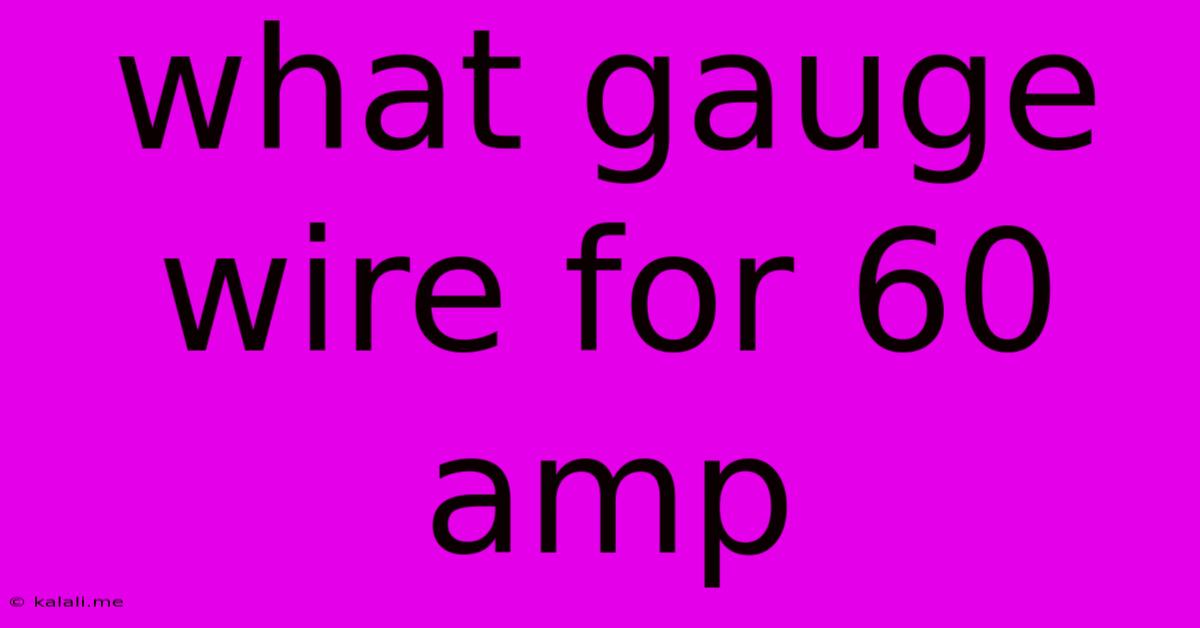What Gauge Wire For 60 Amp
Kalali
Jun 03, 2025 · 3 min read

Table of Contents
What Gauge Wire for 60 Amps? A Comprehensive Guide
Choosing the correct gauge wire for a 60-amp circuit is crucial for safety and proper functionality. Undersized wire can overheat, leading to fire hazards, while oversized wire is unnecessarily expensive. This guide will help you determine the appropriate wire gauge for your 60-amp application, considering factors like material, insulation, and installation environment.
Understanding Wire Gauge and Ampacity
Wire gauge refers to the diameter of the wire. Lower gauge numbers indicate thicker wires, which can carry more current (amperes or amps). Ampacity is the maximum current a wire can safely carry continuously without overheating. The ampacity rating depends on several factors, including:
-
Wire Material: Copper is the most common material for electrical wiring due to its excellent conductivity. Aluminum is also used, but it requires larger gauge wires for the same ampacity due to its lower conductivity.
-
Insulation Type: The type of insulation around the wire affects its ampacity rating. Different insulation materials have different heat resistance properties.
-
Installation Environment: The ambient temperature and the way the wire is installed (e.g., in conduit, buried underground, or in free air) will impact its ampacity. Higher temperatures reduce the ampacity of the wire.
Determining the Correct Gauge for 60 Amps
There's no single answer to "what gauge wire for 60 amps?" The appropriate gauge depends on the factors listed above. However, we can provide some general guidance based on common scenarios:
Copper Wire
For copper wiring in typical residential or light commercial applications, a 6 AWG (American Wire Gauge) wire is generally suitable for 60 amps. This is based on the commonly used ampacity tables for copper wiring with standard insulation in free air. However, always check your local electrical codes and consult with a qualified electrician.
Remember that this is a guideline. If the wire is installed in conduit, buried underground, or subjected to high ambient temperatures, you may need a larger gauge wire to maintain the required ampacity.
Aluminum Wire
Aluminum wiring requires a larger gauge for the same ampacity as copper. For 60 amps, you would likely need a 2 AWG or even a larger gauge aluminum wire, depending on the installation conditions. Aluminum wiring requires special considerations and connectors due to its different properties.
Important Safety Precautions:
-
Consult Local Electrical Codes: Always adhere to local electrical codes and regulations. These codes specify the minimum wire gauge requirements for various applications.
-
Professional Installation: It is highly recommended to have a qualified electrician install any high-amperage wiring. Incorrect installation can lead to fire hazards.
-
Ampacity Tables: Use reputable ampacity tables to determine the appropriate wire gauge based on your specific conditions. These tables are available from electrical supply manufacturers and industry organizations.
-
Overcurrent Protection: Ensure that the circuit is protected by a properly sized circuit breaker or fuse (60 amps in this case) to prevent overcurrent and overheating.
In Conclusion
While a 6 AWG copper wire is a common starting point for a 60-amp circuit, the exact wire gauge will depend on several factors. Always prioritize safety and consult with a licensed electrician to ensure the correct wire gauge and proper installation are used for your specific application. Failure to do so could result in dangerous electrical hazards. Never compromise on safety when working with electrical wiring.
Latest Posts
Latest Posts
-
The Metadata Class Is Used Across Multiple Tasks And Tables
Jun 05, 2025
-
Fastest Way To Get Xp In Minecraft
Jun 05, 2025
-
Rockfish Copy From Cluster To Local Machine
Jun 05, 2025
-
What Is The Story Of The Birds And Bees
Jun 05, 2025
-
Is Sodium Polyacrylate Sticky To Dry Substance
Jun 05, 2025
Related Post
Thank you for visiting our website which covers about What Gauge Wire For 60 Amp . We hope the information provided has been useful to you. Feel free to contact us if you have any questions or need further assistance. See you next time and don't miss to bookmark.